2004年日语专四真题解析
2004年日语专业四级考试试题
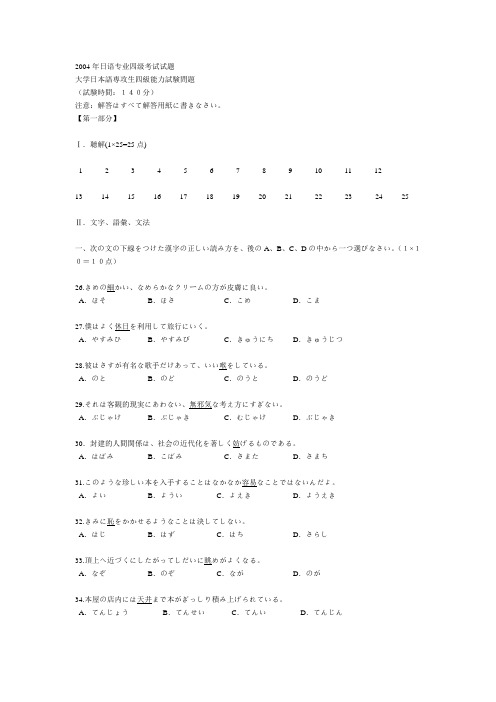
2004年日语专业四级考试试题大学日本語専攻生四級能力試験問題(試験時間:140分)注意:解答はすべて解答用紙に書きなさい。
【第一部分】Ⅰ.聴解(1×25=25点)1 2 3 4 5 6 7 8 9 10 11 1213 14 15 16 17 18 19 20 21 22 23 24 25Ⅱ.文字、語彙、文法一、次の文の下線をつけた漢字の正しい読み方を、後のA、B、C、Dの中から一つ選びなさい。
(1×10=10点)26.きめの細かい、なめらかなクリームの方が皮膚に良い。
A.ほそB.ほさC.こめD.こま27.僕はよく休日を利用して旅行にいく。
A.やすみひB.やすみびC.きゅうにちD.きゅうじつ28.彼はさすが有名な歌手だけあって、いい喉をしている。
A.のとB.のどC.のうとD.のうど29.それは客観的現実にあわない、無邪気な考え方にすぎない。
A.ぶじゃけB.ぶじゃきC.むじゃけD.ぶじゃき30.封建的人間関係は、社会の近代化を著しく妨げるものである。
A.はばみB.こばみC.さまたD.さまち31.このような珍しい本を入手することはなかなか容易なことではないんだよ。
A.よいB.よういC.よえきD.ようえき32.きみに恥をかかせるようなことは決してしない。
A.はじB.はずC.はちD.さらし33.頂上へ近づくにしたがってしだいに眺めがよくなる。
A.なぞB.のぞC.ながD.のが34.本屋の店内には天井まで本がぎっしり積み上げられている。
A.てんじょうB.てんせいC.てんいD.てんじん35.技術はね、そう簡単に習えるものではないんだよ。
A.まなB.しゅうC.ならD.しゅ二、次の文__に入れるのに最も適当な言葉を後のA、B、C、Dから一つ選びなさい。
(1×20=20点)36.人間は誰でも、見てはいけない言われると__見たくなるものだ。
A.あまりB.かなりC.なかなかD.よけい37.持っていたお金を__使ってしまって、おみやげも買えなくなった。
日语专业四级考试试题 绝密
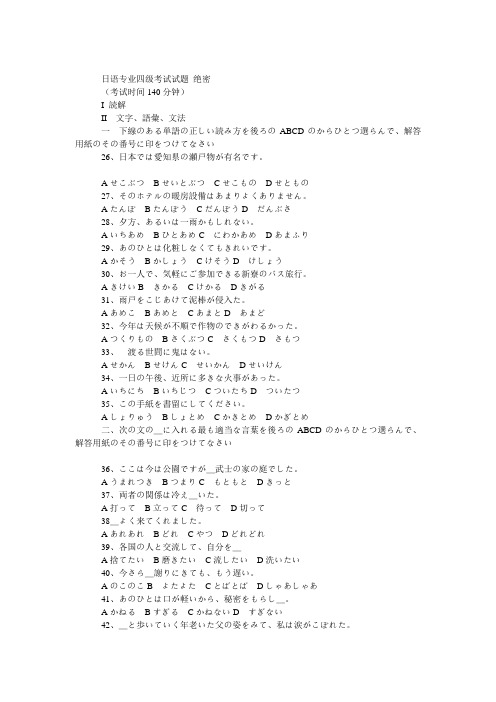
日语专业四级考试试题绝密(考试时间140分钟)I 読解II文字、語彙、文法一下線のある単語の正しい読み方を後ろのABCDのからひとつ選らんで、解答用紙のその番号に印をつけてなさい26、日本では愛知県の瀬戸物が有名です。
AせこぶつBせいとぶつCせこものDせともの27、そのホテルの暖房設備はあまりよくありません。
AたんぽBたんぼうCだんぼうDだんぶさ28、夕方、あるいは一雨かもしれない。
AいちあめBひとあめCにわかあめDあまふり29、あのひとは化粧しなくてもきれいです。
AかそうBかしょうCけそうDけしょう30、お一人で、気軽にご参加できる新寮のバス旅行。
AきけいBきかるCけかるDきがる31、雨戸をこじあけて泥棒が侵入た。
AあめこBあめとCあまとDあまど32、今年は天候が不順で作物のできがわるかった。
AつくりものBさくぶつCさくもつDさもつ33、渡る世間に鬼はない。
AせかんBせけんCせいかんDせいけん34、一日の午後、近所に多きな火事があった。
AいちにちBいちじつCついたちDついたつ35、この手紙を書留にしてください。
AしょりゅうBしょとめCかきとめDかぎとめ二、次の文の_に入れる最も適当な言葉を後ろのABCDのからひとつ選らんで、解答用紙のその番号に印をつけてなさい36、ここは今は公園ですが_武士の家の庭でした。
AうまれつきBつまりCもともとDきっと37、両者の関係は冷え_いた。
A打ってB立ってC待ってD切って38_よく来てくれました。
AあれあれBどれCやつDどれどれ39、各国の人と交流して、自分を_A捨てたいB磨きたいC流したいD洗いたい40、今さら_謝りにきても、もう遅い。
AのこのこBよたよたCとばとばDしゃあしゃあ41、あのひとは口が軽いから、秘密をもらし_。
AかねるBすぎるCかねないDすぎない42、_と歩いていく年老いた父の姿をみて、私は涙がこぼれた。
AすたすたBてくてくCぶらぶらDよたよた43、北海道の海は夏でも冷たい。
2004年日语高考(聴解あり)

2004年普通高等学校招生全国统一考试(※欠損部分あり)日语(含听力)一、听力(共分两节,满分部分30分)二、日语知识运用―从每小题给出的四个选项中,选出一个最佳选项。
(1分×45=45分)16.私はあなた___言ったとおり、明るい服を着てここに来ました。
AのBへCからDと17.君、行く___と言っているのに、それでも行くのか。
AねBよCかDな18.美千子はみんなが騒ぐ___優秀ではない。
AほどBのにCけどDより19.上野駅___降りると、銀行はすぐその前にあります。
AへBでCのDが20.田中さんはへーえ、へーえと聞いて___いて、自分の意見は言わない。
AぐらいBばかりCだけDしか21.新幹線は込んでいて、東京___ずっと立ったままだった。
AにまでBまででCまでDまでに22.去年の10月___この店で働いています。
AまでBからCにDで23.「本田さん、あなたは魚が嫌いでした___。
」「いいえ、好きですよ。
」AねBよCのDわ24.天気___よければ、楽しい旅行になるでしょう。
AならBさえCこそDだけ25.あれから___1か月もたっていない。
AもうBまたCいまDまだ26.彼は急に怒って帰ってしまった。
私たちは何が何だか___分からなかった。
AさっぱりBすっかりCゆっくりDしっかり27.仕事がたくさんありました。
___忙しかったです。
AそこでBそれもCそれがDそれで28.お祭りでもないのに、この人の多さは___何があったんだ?AいったいBどうしてCほんとうにDいっそう29.あのテストは___できたけど、全部はできなかった。
AとてもBおおぜいCかなりDひじょうに30.彼の言うことも分からないではないが、約束した以上___。
AやりきれないBやりおわらないCやることしかないDやるしかない31.もし、何か___ことがあったら、私たちに相談してください。
A困っていたB困ったC困るD困られる32.あの方は学生の指導に熱心で、本当に先生___先生ですね。
2004年考研日语真题假名注音版
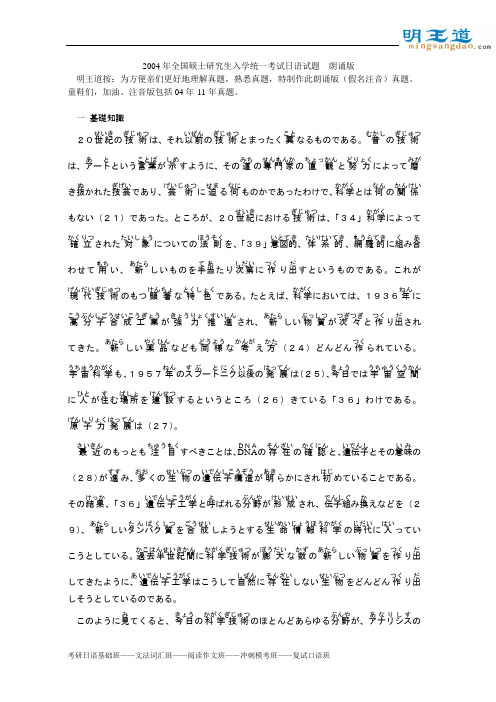
2004年全国硕士研究生入学统一考试日语试题 朗诵版明王道按:为方便亲们更好地理解真题,熟悉真题,特制作此朗诵版(假名注音)真题。
童鞋们,加油。
注音版包括04年-11年真题。
一 基礎知識20世紀せいきの技術ぎじゅつは、それ以前いぜんの技術ぎじゅつとまったく異ことなるものである。
昔むかしの技術ぎじゅつは、アあートとという言葉ことばが示しめすように、その道みちの専門家せんもんかの直観ちょっかんと努力どりょくによって磨みがき抜ぬかれた技芸ぎげいであり、芸術げいじゅつに迫せまる何なにものかであったわけで、科学かがくとは何なんの関係かんけいもない(21)であった。
ところが、 20世紀せいきにおける技術ぎじゅつは、「34」科学かがくによって確立かくりつされた対象たいしょうについての法則ほうそくを、「39」意図的いとてき、体系的たいけいてき、網羅的もうらてきに組くみ合あわせて用もちい、新あたらしいものを手当てあたり次第しだいに作つくり出だすというものである。
これが現代技術げんだいぎじゅつのもつ顕著けんちょな特色とくしょくである。
たとえば、科学かがくにおいては、1936年ねんに高分子合成工業こうぶんしごうせいこうぎょうが強力推進きょうりょくすいしんされ、新あたらしい物質ぶっしつが次々つぎつぎと作つくり出だされてきた。
新あたらしい薬品やくひんなども同様どうような考かんがえ方かた(24)どんどん作つくられている。
宇宙科学うちゅうかがくも、1957年ねんのスプすぷートニクとにく以後いごの発展はってんは(25)、今日きょうでは宇宙空間うちゅうくうかんに人ひとが住すむ場所ばしょを建設けんせつするというところ(26)きている「36」わけである。
原子力発展げんしりょくはってんは(27)。
最近さいきんのもっとも注目ちゅうもくすべきことは、DNA DNAの存在そんざいの確認かくにんと、遺伝子いでんしとその意味いみの(28)が進すすみ、多おおくの生物せいぶつの遺伝子構造いでんしこうぞうが明あきらかにされ初はじめていることである。
2004专四真题及答案详解TEM4word文本
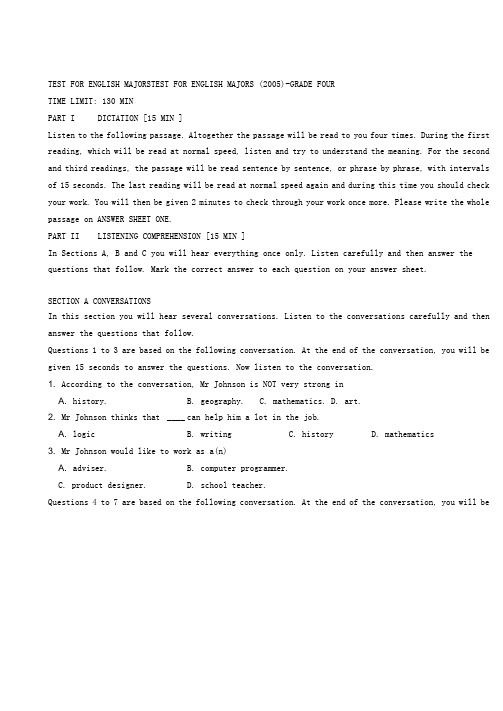
TEST FOR ENGLISH MAJORSTEST FOR ENGLISH MAJORS (2005)-GRADE FOURTIME LIMIT: 130 MINPART I DICTATION [15 MIN ]Listen to the following passage. Altogether the passage will be read to you four times. During the first reading, which will be read at normal speed, listen and try to understand the meaning. For the second and third readings, the passage will be read sentence by sentence, or phrase by phrase, with intervals of 15 seconds. The last reading will be read at normal speed again and during this time you should check your work. You will then be given 2 minutes to check through your work once more. Please write the whole passage on ANSWER SHEET ONE.PART II LISTENING COMPREHENSION [15 MIN ]In Sections A, B and C you will hear everything once only. Listen carefully and then answer the questions that follow. Mark the correct answer to each question on your answer sheet.SECTION A CONVERSATIONSIn this section you will hear several conversations. Listen to the conversations carefully and then answer the questions that follow.Questions 1 to 3 are based on the following conversation. At the end of the conversation, you will be given 15 seconds to answer the questions. Now listen to the conversation.1. According to the conversation, Mr Johnson is NOT very strong inA. history.B. geography.C. mathematics.D. art.2. Mr Johnson thinks that ____ can help him a lot in the job.A. logicB. writingC. historyD. mathematics3. Mr Johnson would like to work as a(n)A. adviser.B. computer programmer.C. product designer.D. school teacher.Questions 4 to 7 are based on the following conversation. At the end of the conversation, you will be4. What is the main purpose of the research?A. To make preparations for a new publication.C. To know how housework is shared.5. What does the man do on Fridays?A. He goes to exercise classes.C. He goes to the cinema.6. On which day does the couple always go out?A. Friday.B. Saturday.7. Which personal detail does the man give?A. Surname.B. First name.B. To learn how couples spend their weekends.D. To investigate what people do at the weekend.B. He goes sailing.D. He stays at home.C. Sunday.D. Any weekday.C. Address.D. Age.B. The train to Zhengzhou.D. The train to Hangzhou.given 20 seconds to answer the questions. Now listen to the conversation. Questions 8 to 10 are based on the following conversation. At the end of the conversation, you will be given 15 seconds to answerthe questions. Now listen to the conversation.8. Parcel Express needs the following details about the sender EXCEPTA. name.B. address.C. receipt.D. phone number.9. Parcels must be left open mainly forA. customs 'check.B. security check.C. convenience 's saDk.et.he company 's sake.10. The woman 's last inquiry is mayincloncerned withA. the time needed for sending the parcel.B. the flight time to New York.C. the parcel destination.D. parcel collection. SECTION B PASSAGESIn this section, you will hear several passages. Listen to the passages carefully and then answer the questions that follow.Questions 11 to 13 are based on the following passage. At the end of the passage, you will be given 15 seconds to answer the questions. Now listen to the passage.11. Where is the train to Nanjing now standing?A. At Platform 7.B. At Platform 8.C. At Platform 9.D. At Platform 13.12. Which train will now leave at 11:35?A. The train to Jinnan.C. The train to Tianjin.13. Which train has now been cancelled?A. The train to Jinnan.B. The train to Zhengzhou.C. The train to Tianjin.D. The train to Hangzhou.Questions 14 to 17 are based on the following passage. At the end of the passage, you will be given 20 seconds to answer the questions. Now listen to the passage.14. The museum was built in memory of those A. who died in wars.C. who lost their families in disasters.15. Henry Durant put forward the idea because he A. had once fought in a war in Italy.C. had assisted in treating the wounded.B. who worked to help victims. D. who fought in wars.B. had been wounded in a war.D. had seen the casualties and cruelties of war.A. It is just a lot of cheering.B. It mainly involves yelling.16. Which of the following statements about the symbols is INCORRECT? A. Both are used as the organizati on 's official symbols. B. Both are used regardless of religious significance. C. The red cross was the organization's original symbol.D. The red crescent was later adopted for use in certain regions. 17. How should cheerleading be viewed according to the passage?C. It mainly involves dancing.D. It is competitive in nature.Questions 18 to 20 are based on the following passage. At the end of the passage, you will be given 15 seconds to answer the questions. Now listen to the passage. 18. How do the cheerleaders perform their jobs? A. They set fireworks for their team. B. They put on athletic shows. C. They run around the spectators.D. They yell for people to buy drinks.19. Why do the cheerleaders sometimes suffer physical injuries? A. Because they try dangerous acts to catch people's attention.B. Because they shout and yell so their voice becomes hoarse.C. Because they go to the pyramid and the hills to perform.D. Because they dance too much every day for practice. 20. Which of the following statements is NOT true?A. The first cheerleaders was a man named John Campbell.B. Cheerleaders 'contests are only held at the state level.C. Before 1930 there were no women cheerleaders.D. The first cheerleading occurred in 1898. SECTION C NEWS BROAOCASTQuestions 21 to 22 are based on the following news. At the end of the news item, you will be given 10 seconds to answer the questions. Now listen to the news.21. How many of the emigrants died after being thrown into the sea? A. 15 of them.B. 3 of them.C. 100 of them.D. Dozens of them.22. The illegal emigrants came fromA. Italy.B. Africa.C. the Mediterranean region.D. places unknown. Question 23 is based on the following news. At the end of the news item, you will be given 5 seconds to answer the question. Now listen to the news.23. What does the news item mainly report?A. China will send three people into space in a week.B. Three Chinese astronauts will spend a week in space.C. The Shenzhou VI will be launched next year.D. Shenzhou V circled the earth for two days.Questions 24 and 25 are based on the following news. At the end of the news item, you will be given 10 seconds to answer the questions. Now listen to the news.24. Which of the following had NOT been affected by the wildfires?A. Houses.B. Land.C. Skies.D. Cars.25. The fires were thought to have been startedA. purposefully.B. accidentally.C. on the Mexican border.D. in southern California.Questions 26 to 28 are based on the following news. At the end of the news item, you will be given 15 seconds to answer the question. Now listen to the news.26. _______ r anks second among leading tourism nations.A. FranceB. The United StatesC. SpainD. Italy27. It is predicted that by 2020 China will receive visitors.A. 77 millionB. 130 millionC. 36.8 millionD. 100 million28. According to a Xinhua report, last year saw a ______ per cent increase in the number of Chinese traveling abroad.A. 16.6B. 30C. 100D. 37Question 29 and 30 are based on the following news. At the end of the news item, you will be given 10 seconds to answer the question. Now listen to the news.29. What would happen to the Argentine officers?A. They would be arrested by Spanish authorities.B. They would be tried in an Argentine court.C. They would be sent to Spain for trial.D. They would be tortured or murdered.30. What accusation would the Argentine officers face?A. Violation of human rights.B. Involvement in illegal actions.C. Planning anti-government activities.D. Being part of the military rule.PART III CLOZE [15 MIN. ]Decide which of the choices given below would best complete the passage if inserted in the corresponding blanks. Mark the best choice for each blank on your answer sheet.A person 's home is as much a reflection of his personality as the clothes he wears, the food he eats and the friends with whom he spends his time. Depending on personality, most have in mind a(n) “ (31) __________ home ” . But in general, and especially for the student or new wage earners, there are practical (32) _____ o f cash and location on achieving that idea.Cash (33) _______ , in fact, often means that the only way of (34) _ when you leaveschool is to stay at home for a while until things (35) financially. There are obvious (36) of living at home—personal laundry is usually (37) done along with the family wash; meals are provided and there will be a well-established circle of friends to (38) . And there is (39) the responsibility for paying bills, rates, etc. On the other hand, (40) depends on how a family gets on. Do your parents like your friends? Youmay love your family —(41) ____ do you like them? Are you prepared to be (42) ______when your parents ask where you are going in the evening and what time you expect to be back? If you find that you cannot manage a(n) (43) ________ , and that you finally have the money to leave,how do you (44) ________ finding somewhere else to live? If you plan to stay in your home area, the possibilities are (45) ___ well-known to you already. Friends and the local paper are always (46) _________ . If you are going to work in a (47) ________ area, again there are the papers—and the accommodation agencies, (48) ______ t hese should be approached with (49)_________ . Agencies are allowed to charge a fee, usually the (50) of the first week if you take accommodation they have found for you.31. A. ideal B. perfect C. imaginary D. satisfactory32. A. deficiencies B. weaknesses C. insufficiencies D. limitations33. A. cut B. shortage C. lack D. drain34. A. getting over B. getting in C. getting back D. getting along35. A. improve B. enhance C. develop D. proceed36. A. concerns B. issues C. advantages D. problems37. A. still B. always C. habitually D. consequently38. A. call in B. call over C. call upon D. call out39. A. always B. rarely C. little D. sometimes40. A. little B. enough C. many D. much41. A. and B. but C. still D. or42. A. tolerant B. hostile C. indifferent D. good-tempered43. A. agreement B. consensus C. compromise D. deal44. A. go about B. go over C. go in for D. go through45. A. seldom B. less C. probably D. certainly46. A. dependent B. a good source of informationC. of great valueD. reliable47. A. familiar B. cold C. humid D. new48. A. though B. while C. since D. as49. A. enthusiasm B. hesitation C. caution D. concern50. A. same B. equivalent C. equal D. similarityPART IV GRAMMAR &VOCABULARY [15 MIN ]There are thirty sentences in this section. Beneath each sentence there are four words or phrases marked A, B, C and D. Choose one word or phrase that best completes the sentence. Mark your answers on your answer sheet51. If you explained the situation to your solicitor, he able to advise you much better thanI can.A. would beB. will have beenC. wasD. were52. ________ , Mr. Wells is scarcely in sympathy with the working class.A. Although he is a socialistB. Even if he is a socialist。
2004年日语能力测试语法真题解析

しゃべりもしないで/「しないで」表状态Βιβλιοθήκη ▲全句翻译:一言不发地回了家。
問題 V次の文の___にはどんな言葉を入れたらよいか。1·2·3·4から昀も適当なものを一つ選びなさい。
(46) 私たちは、彼の突然の辞職に、戸惑いを___。 1おぼえさせた 2余儀なくさせた 3感じきれなかった 4禁しえなかった
禁じえなかった/表示无法压抑某种心情“不由地”“不禁”
▲全句翻译:虽说是国际政治的专家,分析每日不断变化的世界形势也是很困难的。
(33) 著名な画家の行方不明になっていた作品が発見___、非常に喜ばしいことだ。
1されたとは 2されては 3されるのには 4されるかどうか
されたとは/「とは」常与后面的「ことだ」搭配
▲全句翻译:著名作家不知去向的作品被发现了,实在是一件值得高兴的事。
▲全句翻译:可以让我把伞放在门那里吗?
(38) ウイルスの感染経路を明らかに___調査が行われた。 1すまじと 2すべく 3するはおろか 4すべからず
すべく/「べく」意为“为了……”,而「すべく」则是「する+べく」,可写为「すべく」或「するべく」
▲全句翻译:为查明病毒的感染途径进行了调查。
(39) カメラマンは自らの命も___戦場に向かった。
願ってやまない/「やまない」前常接「祈る」「願う」「期待する」的「て」形,起强调作用。
▲全句翻译:不屈服于困难、不断努力的她真的是很出色。我衷心期盼着她的成功。
(58) 毎日遅くまで、必死に頑張る___。そんなことをして、体をこわしては意味がない。 1べきだ 2つもりだ 3ことはない 4にちがいない
2004年语法真題解析.txt 問題Ⅳ 次の文の___にばとんな言葉を入れたらよいか。1·2·3·4から昀も適当ななものを一つ選びなさい。 (26) 当社では学歴を___多くの優秀な人材を集めるため、履歴書の学歴欄を廃止した。
2004年专四语法题
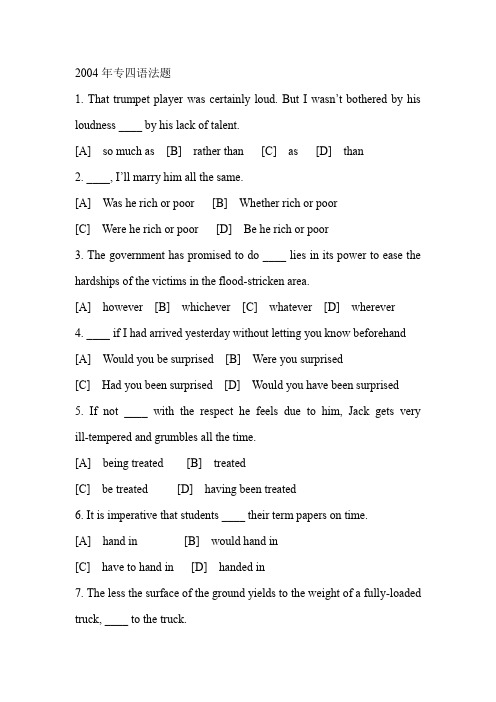
2004年专四语法题1. That trumpet player was certainly loud. But I wasn’t bothered by his loudness ____ by his lack of talent.[A] so much as [B] rather than [C] as [D] than2. ____, I’ll marry him all the same.[A] Was he rich or poor [B] Whether rich or poor[C] Were he rich or poor [D] Be he rich or poor3. The government has promised to do ____ lies in its power to ease the hardships of the victims in the flood-stricken area.[A] however [B] whichever [C] whatever [D] wherever4. ____ if I had arrived yesterday without letting you know beforehand[A] Would you be surprised [B] Were you surprised[C] Had you been surprised [D] Would you have been surprised5. If not ____ with the respect he feels due to him, Jack gets very ill-tempered and grumbles all the time.[A] being treated [B] treated[C] be treated [D] having been treated6. It is imperative that students ____ their term papers on time.[A] hand in [B] would hand in[C] have to hand in [D] handed in7. The less the surface of the ground yields to the weight of a fully-loaded truck, ____ to the truck.[A] the greater stress is [B] greater is the stress[C] the stress is greater [D] the greater the stress8. The Minister of Finance is believed ____ of imposing new taxes to raise extra revenue.[A] that he is thinking [B] to be thinking[C] that he is to think [D] to think9. Issues of price, place, promotion, and product are ____ conventional concerns in planning marketing strategies.[A] these of the most [B] most of those[C] among the most [D] among the many of10. ____ both sides accept the agreement, a lasting peace____ be established in this region.[A] Only if...will [B] If only...would[C] Should...will [D] Unless...would11. Mr. Wells, together with all the members of his family, ____ for Europe this afternoon.[A] are to leave [B] are leaving [C] is leaving [D] leave12. It was suggested that all government ministers should ____ information on their financial interests.[A] discover [B] uncover [C] tell [D] disclose13. As my exams are coming next week, I’ll take advantage of the weekend to ____ on some reading.[A] catch up [B] clear up [C] make up [D] pick up14. I’m surprised they are no longer on speaking terms. It’s not like either of them to bear a ____.[A] disgust [B] curse [C] grudge [D] hatred15. Mary hopes to be ____ from hospital next week.[A] dismissed [B] discharged [C] expelled [D] resigned16. Once a picture is proved to be a forgery, it becomes quite ____.[A] invaluable [B] priceless [C] unworthy [D] worthless17. Jimmy earns his living by ____ works of art in the museum.[A] recovering [B] restoring [C] renewing [D] reviving18. I couldn’t sleep last night because the tap in the bathroom was ____.[A] draining [B] dropping [C] spilling [D] dripping19. The book gives a brief ____ of the course of his research up till now.[A] outline [B] reference [C] frame [D] outlook20. She was standing outside in the snow, ____ with cold.[A] spinning [B] shivering [C] shaking [D] staggering21. All the rooms on the second floor have nicely ____ carpets, which are included in the price of the house.[A] adapted [B] equipped [C] suited [D] fitted22. He plays tennis to the ____ of all other sports.[A] eradication [B] exclusion[C] extension [D] inclusion23. She answered with an ____ “No” to the request that she attend the public hearing.[A] eloquent [B] effective [C] emotional [D] emphatic24. Everyone who has visited the city agrees that it is ____ with life.[A] vibrant [B] violent [C] energetic [D] full25. We met Mary and her husband at a party two months ago. ____ we’ve had no further communication.[A] Thereof [B] Thereby [C] Thereafter [D] Thereabouts参考答案:1-5: DC A B 6-10: A D B C A 11-15: C D A C B16-20: D B D A B 21-25: D B D AC1. That trumpet player was certainly loud. But I wasn’t bothered by his loudness ____ by his lack of talent.[A] so much as [B] rather than [C] as [D] than【参考答案】:A【题目解析】:固定用法。
2004年日语四级试题和答案
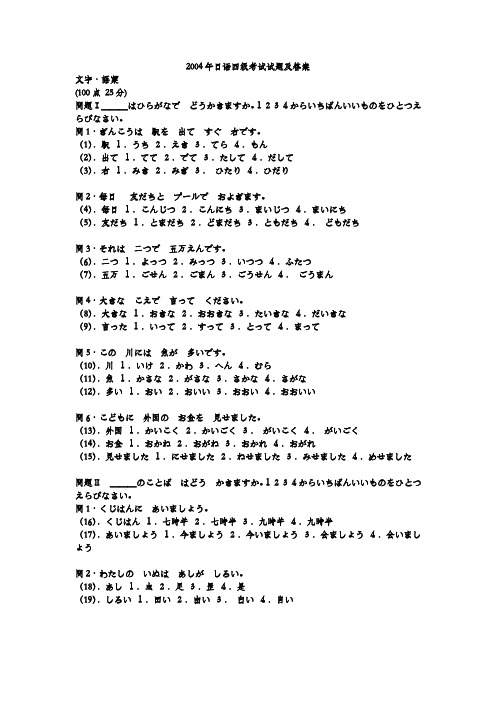
2004年日语四级考试试题及答案文字・語彙(100点25分)問題Ⅰ___はひらがなでどうかきますか。
1234からいちばんいいものをひとつえらびなさい。
問1・ぎんこうは駅を出てすぐ右です。
(1).駅1.うち2.えき3.てら4.もん(2).出て1.てて2.でて3.たして4.だして(3).右1.みき2.みぎ3.ひたり4.ひだり問2・毎日友だちとプールでおよぎます。
(4).毎日1.こんじつ2.こんにち3.まいじつ4.まいにち(5).友だち1.とまだち2.どまだち3.ともだち4.どもだち問3・それは二つで五万えんです。
(6).二つ1.よっつ2.みっつ3.いつつ4.ふたつ(7).五万1.ごせん2.ごまん3.ごうせん4.ごうまん問4・大きなこえで言ってください。
(8).大きな1.おきな2.おおきな3.たいきな4.だいきな(9).言った1.いって2.すって3.とって4.まって問5・この川には魚が多いです。
(10).川1.いけ2.かわ3.へん4.むら(11).魚1.かさな2.がさな3.さかな4.さがな(12).多い1.おい2.おいい3.おおい4.おおいい問6・こどもに外国のお金を見せました。
(13).外国1.かいこく2.かいごく3.がいこく4.がいごく(14).お金1.おかね2.おがね3.おかれ4.おがれ(15).見せました1.にせました2.ねせました3.みせました4.めせました問題Ⅱ___のことばはどうかきますか。
1234からいちばんいいものをひとつえらびなさい。
問1・くじはんにあいましょう。
(16).くじはん1.七時羊2.七時半3.九時羊4.九時半(17).あいましょう1.今ましょう2.今いましょう3.会ましょう4.会いましょう問2・わたしのいぬはあしがしろい。
(18).あし1.虫2.足3.昰4.是(19).しろい1.田い2.由い3.白い4.自い問3・あそこにおとこのひとがいます。
(20).おとこ1.甼2.叧3.畀4.男(21).ひと1.人2.太3.夫4.天問4・すぺいんでえいごをべんきょうしています。
- 1、下载文档前请自行甄别文档内容的完整性,平台不提供额外的编辑、内容补充、找答案等附加服务。
- 2、"仅部分预览"的文档,不可在线预览部分如存在完整性等问题,可反馈申请退款(可完整预览的文档不适用该条件!)。
- 3、如文档侵犯您的权益,请联系客服反馈,我们会尽快为您处理(人工客服工作时间:9:00-18:30)。
文章2
1. まといついています――纏い付く
(からみつく、まつわりつく) 2. 読み取る:読んで内容を理解する。 また、外観から内面を推し量る。 3. 感嘆符(かんたんふ)
2004年 日语专业四级真题解析
36: よけい: (1)多余,无用(必要な度を超えてむだなこと)。 余計な心配をする 。 余計なおせわだ。 余計なことをするな! (2)富余,多余(普通より分量の多いこと。程度が上な こと)。 椅子がひとつ余計にある。 ふたつ余計に買う。 (3)更多,更加,格外,分外(程度・分量がさらに増す さま)。 人より余計に働く/比别人干得多。 いつもより余計に勉強した/比平常更加用功。
54:
(~た)ところ【N2语法】
<接续>:动词过去时+たところ <意味> (1)「~たところ」作接续助词用,前接动词过去时。表示 确定的顺接,相当于「たら」的部分用法。 山田さんと相談したところ、彼は大賛成した。 本人に確かめたところ、彼はそんな場所へはいったことが ないという。 電話帳で調べたところそういう名前の学校はなかった。 先生に旅行のお土産をあげたところ、とても喜んでくれた。 その薬を飲んだところが、病気がよくなってきた。 (2)「~たところが」表示逆接,后项往往与意志或设想相 反,(较多使用「たところが」的形式)。 叱られるかとおもったところが、かえって褒められた。
38:
大いに:たくさん、はなはだ。 大いに喜ぶ。 大いにちがう。 大いに自信がある。 大いに意味がある。 あいにく:期待や目的にそわない状況になって,都 合が悪く残念なさま。 あいにく雨が降り出した。 あいにくなことに旅行中で会えなかった/。 運動会にはあいにくの雨だ。 けっこう:有副词词性,相当、很好地。(十分とは 言えないが、ある程度要求に答えている様。) 結構役に立つ。
ことはない【N2语法】
(1)动词+ことはない=「~する必要がない」 小さい地震だから、慌てることはない。 お父さんの病気は大丈夫だから、君は何も心配する ことはない。 そんなにきらいなら、無理して食べることはない。 兄弟の間で、遠慮することはないよ、何かあったら 言ってね。 失敗を恐れる心配はない。 (2)ただのあることの起こる可能性が低いという ことを意味する。 こんなに晴れているんだから、今夜雨が降ることは ないよ。。
ห้องสมุดไป่ตู้ 読解
2. 老ける(ふける)
文章1
1. なにしろ:とにかく、つまりは。 3. 思い切って:ためらう気持ちを振り切って物事 をするさま。決心して。 4. 嫌われたら嫌われたっていい?
5. 開き直って?
6. 最寄り(もより) 7. ジャンバー:袖なしの。
8. しばし:しばらく、ちょっとの間。
9. 果たして~か:果真……吗?真的……吗?
うれしくてしばらくはものも言えないくらいでした。
やっと車が一台通れるくらい狭い道だった。 彼からもらった指輪には、見えないくらいの小さな宝石がつい
ていた。
51
わけではない【N2语法】
< 接 续> 动词、形容词辞書形+わけではない 形容动词+な+わけではない <意味> 并不是…,并非…,并没……。用来表示部分否 定。(あることを部分的に否定している。) 友達にパーティに誘われて、行きたくないわけでは ないが、すぐに返事をしなかった。。 今の生活に満足しているといっても、不満がないわ けではない。。
練習(参考用正解): 1. 今日は頭が痛いから、休みたい。しかし、試験がある ので、休むわけにはいかない。 2. 先週、田中さんから「お金を貸してください」と頼ま れた。私も以前、田中さんから借りたことがあるから、 断わるわけにはいかなかった。 3. 「これは亡くなった父からもらった、大切な時計です から、あげるわけにはいきません。」 4. あしたはほかの仕事をしなければならないのだから、 この仕事をやりかけのまま、帰るわけにはいかない。 5. これは先生の本だから、あなたに貸すわけにはいきま せん。 6. 一人でやるのはたいへんですが、みんな忙しそうなの で手伝ってもらうわけにはいきません。
55:
(~た)とたん(に)/途端(に)
【N2语法】
< 接续> 动词过去时+とたん <意味> 「とたん」可以接在动词过去时或连体词「その」之 后,表示""就在那一瞬间……"",两者相隔时间相当短。 暑くなったとたん、ビールの売れ行きがよくなった。 テレビから漫画のテーマソングが流れ出したとたん、部 屋にいた子供たちが踊り出した。 電話を切ったとたんに、また次の電話がかかってきた。 窓を開けた、そのとたん、冷たい風が入ってきた
48: より:时间或空间的起点。或者表示比较的基准。 ことに:格外,分外,尤其。 かぎり:只要……就……。 くらい:表示程度。
くらい【N2语法】
< 接 续> <意味> 名词+くらい 「くらい」接在活用词连体形后面表示程度。前面也可 以直接接体言,副词或助词。「ぐらい」多用于口语。「~くらい」 的形式在句子中作状语;「~くらいの」的形式则可以用来作定语。
練習: 1. 今日は頭が痛いから、休みたい。しかし、試験がある ので、 。 2. 先週、田中さんから「お金を貸してください」と頼ま れた。私も以前、田中さんから借りたことがあるか ら、 。 3. 「これは亡くなった父からもらった、大切な時計です から、 。」 4. あしたはほかの仕事をしなければならないのだから、 この仕事をやりかけのまま、 。 5. これは先生の本だから、あなたに 。 6. 一人でやるのはたいへんですが、みんな忙しそうなの で 。
【练习】翻译一下句子: 1. 作业做是做了,但并没完全做完。 2. 那个人并非不对,大家都有责任。 3. 我学生时代时,并不是光在学习,也经常 旅行。 4. 你想要辞职的心情,我并不是不懂。但你 也要好好考虑考虑将来。 5. 并没发烧,但总觉得身体乏。 6. 今天的会,我并不是特别想去,是因为被 拜托了所以必须得去。
40: こと:接在句子末尾表示命令。 わい:表示感叹、惊讶。 だい:表示疑问。 ぞ:表示自言自语,也可以表示轻微的疑问。
【こと(終助詞)】《形式名詞「こと」から》活用語の連
体形に付く。ただし、形容動詞・助動詞「だ」には終止形にも 付く。 ① 感動を表す。「まあ、きれいに咲いた―」「大変な人出だ―」 ② 質問の意を表す。「お変わりありません―」「これでいい ―」 ③ 同意を求めたり、勧誘したりする意を表す。「皆さんもそう お思いにならない―」「そろそろいらっしゃいません―」 ④ (「ことよ」の形で)婉曲(えんきょく)な断定を表す。 「気を遣わなくてもいい―よ」「学生らしくない―よ」 ⑤ 命令・注意の意を表す。「明日までに用意する―」「大声 を出さない―」
[補説]文を止めて感動を表す用法が終助詞化してできたもの。 5を除いては、主に女性の会話に用いられる。
41:
一方だ:表示一个劲儿地,越来越。 一杯(いっぱい):表示满满的。 片方(かたほう):表示一方面。 両方(りょうほう):表示双方、两方面。
【~一方だ】【N2语法】
<接续> 动词原型+一方だ <意味> 多为带有变化意思的内容,表示某种状态、倾向、 情况不断发展,“越来越……”。 『寒くなりましたね。』『ええ、これからは寒くなる一 方ですね。』 彼の病状は悪化する一方だ。 景気が悪くて、ここ数年、失業率はあがる一方だ。
练习(正解) 1. 宿題をやったことはやったが、全部終わったわけ ではない。 2. あの人だけが悪いわけではない。皆、責任がある。 3. わたしは学生時代に勉強ばかりしていたわけでは ない。よく旅行もした。 4. 会社をやめたいという、あなたの今の気持ちもわ からないわけではありません。しかし、将来のこ とをよく考えて…… 5. 熱があるわけではないが、なんとなく体が疲れた 感じがする。 6. 今日の会には特に行きたいわけではないんだけど、 頼まれたから出席するんです。
58:
(~る)ばかりだ
以「~るばかりだ」的形式,表示不断地……(负 面),朝一个方向发展。
手術が終わってからも、父の病気は悪くなるばかり
でした。
67: 【~ほかはない】【N2语法】 < 接 续> 動詞基本形+ほかはない <意味> 除此之外没有别的办法。(ほかに方法がな い、しかたがないからそうするとあきらめの気持ち で言うときの表現。) 【類似表現】ほかない/よりほかない/しかない/ よりない/ほかしかたがない だれにも頼めないから、自分でやるほかはない。 わたしの不注意で壊したのだから、弁償するほ かない。
71:
【わけにはいかない】【N2语法】 <接续> 動詞基本形/未然形+ない +わけにはいかない <意味> ① 前接动词连体形,表示受到情理的约束,不可以这么做。 ② 接动词否定式的后面表示必须这么做,不能不这么做。 絶対にほかの人に言わないと約束したので、話すわけに はいかない。 あした試験があるので、勉強しないわけにはいきません。
53:
ことだ【N2语法】 <接续> 动词原形、动词未然形+ことだ <意味> 形式体言「こと」前接活用词连体形。表示比较强烈 的提醒、劝诱等意思,相当于“应该……”、“最好 ……”、“必须……”等等。因此,前项动词一般使用现 在时。 「自分はもう子供ではない」という事を強く頭に入れる ことだ。 休みには勉強のことなど忘れて、十分に楽しむことだ。 「できない」といっているのではなく、一度自分でやっ てみることだ。 そんなばかなことは言わないことです。
